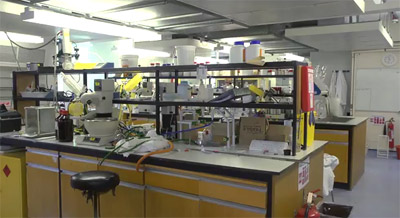Light-Activated Suncream That Will Cut Skin Cancer

Light-Activated Suncream That Will Cut Skin Cancer
Scientists at the University of Bath (UK) have created an innovative suncream ingredient which when applied to the skin could help protect against skin ageing and skin cancer.
Watch a short 2 minute video explaining the research 'Light Activated Suncream'.
While many suncreams provide good protection against the sun's UVB rays, the chief cause of skin reddening and sunburn, they provide less protection against more prevalent UVA rays. Scientists believe this may be one of the reasons why skin cancer incidence rates are increasing worldwide.
Now researchers from the University of Bath's Department of Pharmacy & Pharmacology have created an ingredient which when applied in a suncream will act as a UVA filter and provide fuller protection against skin damage.
The scientists in Bath have previously shown that when exposed to the UVA component of sunlight, the skin releases iron and produces free radicals. Free radicals are harmful species that damage the skin cells by interacting with fat, protein and DNA of the cells. The release of free iron promotes the formation of additional, harmful free radicals that increase the damage caused and has been shown to play a key role in skin ageing and the onset of skin cancer.
The new compounds are light activated when exposed to relevant doses of UVA, and unique in how they release anti-oxidants to neutralise free radicals whilst at the same time capturing excess iron in the skin.
Dr Charareh Pourzand, Researcher in Pharmacy & Pharmacology said: 'Antioxidants have already been used as a means to counteract the skin damage caused by UVA. However these agents are not effective, since the simultaneous release of iron in the cells continues to generate more harmful free radicals. The use of -naked' iron chelators for skin protection is also not adequate, since such agents would starve the cells from the iron that is necessary.
'The molecules we have developed respond to sunlight and provide a safe solution to this problem. The potential medical impact of this project is significant as the caged-iron chelators could provide a highly effective means of protection against UVA- and UVB-induced skin damage and associated skin cancer."
Medicinal chemist Dr Ian Eggleston added: 'The new compounds that we are synthesising provide a highly effective means of protection against both UVA- and UVB-induced skin damage and associated skin cancer, without inducing toxicity in cells. These compounds will be applied as a -pro-drug' to the skin as part of a suncream, and then activated at the right time and in the right place by UVA."
At the beginning of the year this work benefited from a grant provided by Garnier and the British Skin Foundation.
Hermione Lawson, from the British Skin Foundation, commented: "We are very excited to play a part in this pioneering research that could lead to a new generation of sunscreens. It is essential this kind of scientific research continues to be funded so that we can further our understanding of the complex relationship between UV rays and the development of skin cancer. We look forward to the continued findings of Drs Pourzand and Eggleston and their team."
View a full list of the University's press releases: http://www.bath.ac.uk/news
Follow the University's latest news: www.twitter.com/UniofBath
MORE
- Chiropractic Myths & Truths
- Gerard Fogarty Arthritis and Knee Replacement...
- Kym Ellery The ELLERY Eyewear Collection Interview
- Dr Ross Walker The Real Modern Killers Interview
- Shelly Horton Hay Fever Help Interview
- Sebastian VanVeenendaal Royal Rehab's Beach...
- Abigail Koch Family Private Health Insurance...
- Monique Cashion Organic Awareness Month Interview
- Dr Bill Harris Omega-3s Interview
- The Top Ten Health Myths Busted
- Professor Bolin IBD Management a Life-Long...
- Anthia Koullouros Best Cold and Flu Defence...
- Leprosy in NSW
- Julie-Anne Mitchell Go Red for Women Healthy...
- Insight into Chronic Disease Hospitalisations...
- Jeff Chan Mobile Phone Allergies Interview
- How to Conquer Bad Winter Health Habits
- Bad Cholesterol Behind Cancer Spreading In Body
- New Screening Test Recommended To Help Prevent...
- Support For The Rural Nurse Workforce A...
- Kathy Nielsen Ovarian Cancer Australia National...



